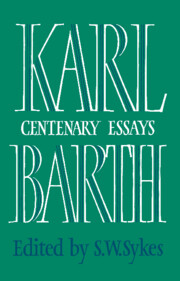Book contents
- Frontmatter
- Contents
- Note on the text
- 1 Introduction
- 2 Karl Barth's eschatological realism
- 3 The triune God and the freedom of the creature
- 4 Authority and openness in the Church
- 5 Ad Limina Apostolorum in retrospect: the reaction of Karl Barth to Vatican II
- 6 The reception of the theology of Karl Barth in the Anglo-Saxon world: history, typology and prospect
2 - Karl Barth's eschatological realism
Published online by Cambridge University Press: 26 February 2010
- Frontmatter
- Contents
- Note on the text
- 1 Introduction
- 2 Karl Barth's eschatological realism
- 3 The triune God and the freedom of the creature
- 4 Authority and openness in the Church
- 5 Ad Limina Apostolorum in retrospect: the reaction of Karl Barth to Vatican II
- 6 The reception of the theology of Karl Barth in the Anglo-Saxon world: history, typology and prospect
Summary
The title of this piece, ‘Karl Barth's eschatological realism’, is a deliberate mixture of theological and philosophical vocabulary. It is an intentional way of provoking response to the scandalous character of Barth's position. He is, I shall argue, an unashamed realist. He believes eschatological realism to be the only theological position worth defending. And he defends it by expounding rather than by justifying it. In a world which increasingly views Christian faith and theology with condescension or even contempt, he made it perfectly clear that the job that really wants doing is to expound the Christian faith rather than to justify it; or, in any case, that the justification required is identical with exposition. For him to do theology, not to justify doing theology is the prime task of a church theologian as he wanted to be. And the exceptional single-mindedness with which he pursued this task is the secret of the monumental theological achievement of this ‘God-intoxicated man’, as he has been described, who started his career as a theological enfant terrible and ended as being proclaimed the Church father of the twentieth century. Thus what I propose to do in this chapter is to make as explicit as possible the scandalous nature of his theology and the continuous challenge which it poses to most of our ways of doing theology.
When Barth entered the theological scene in 1919 with his Epistle to the Romans he shocked the contemporary world of theological liberalism and historically minded religious idealism by contradicting virtually everything in which it believed.
- Type
- Chapter
- Information
- Karl BarthCentenary Essays, pp. 14 - 45Publisher: Cambridge University PressPrint publication year: 1989
- 5
- Cited by



